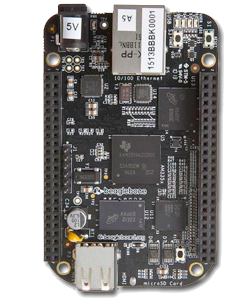 We used to keep a list of Linux friendly embedded board makers. When this page was created in the mid 2000s, this page was easy to maintain. Though more and more products were created with Linux, it was still difficult to find good hardware platforms that were supported by Linux.
We used to keep a list of Linux friendly embedded board makers. When this page was created in the mid 2000s, this page was easy to maintain. Though more and more products were created with Linux, it was still difficult to find good hardware platforms that were supported by Linux.
So, to help community members and system makers selecting hardware for their embedded Linux projects, we compiled a first selection of board makers that were meeting the below criteria:
- Offering attractive and competitive products
- At least one product supported Free Software operating systems (such as Linux, eCos and NetBSD.
- At least one product meeting the above requirements, with a public price (without having to register), and still available on the market.
- Specifications and documentation directly available on the website (no registration required). Engineers like to study their options on their own without having to share their contact details with salespeople who would then chase them through their entire life, trying to sell inappropriate products to them.
- Website with an English version.
In the beginning, this was enough to reduce the list to 10-20 entries. However, as Linux continued to increase in popularity, and as hardware platform makers started to understand the value of transparent pricing and technical documentation, the criteria were no longer sufficient to keep the list manageable.
Therefore, we added another prerequisite: at least one product supported (at least partially) in the official version of the corresponding Free Software operating system kernel. This was a rather strong requirement at first, but only such products bring a guarantee for long term community support, making it much easier to develop and maintain embedded systems. Compare this with hardware supporting only a very old and heavily patched Linux kernel, for example, which software can only be maintained by its original developers. This also reveals the ability of the hardware vendor to work with the community and share technical information with its users and developers.
Then, with the development of low-cost community boards, and chip manufacturers efforts to support their hardware in the mainline Linux kernel, the list again became difficult to maintain.
The next prerequisite we could add is the availability as Open-source hardware, allowing customers to modify the hardware according to their needs. Of course, hardware files should be available without registration.
However, rather than keeping our own list, the best is to contribute to Wikipedia, which has a dedicated page on Open-Source computing hardware. At least, all the boards we could find are listed there, after adding a few.
Don’t hesitate to post comments to this page to share information about hardware which could be worth adding to this Wikipedia page!
Anyway, the good news is that Linux and Open-Source friendly hardware is now easier and easier to find than it was about 10 years back. Just have a preference for hardware that is supported in the mainline Linux kernel sources, or at least from a maker with earlier products which are already supported. A git grep -i command in the sources will help.

The boards from FriendlyARM at andahammer.com are transitioning to 100% open source Linux – mostly Debian but also a kernel and Android or generic kernel + Qt4/E. The ones with Debian can take advantage of the Debian ARM repositories with apt-get.
They are making Python libs for all the I/O to go along with the usual C code. Github with new tools for boot and system building and all the soruces + Wiki.
Although Gumstix COMs are not truly open-source, our expansion boards definitely are. In addition, we have Geppetto D2O, our design-to-order custom expansion board design tool that allows anyone to design a board in hours to have it manufactured and shipped out in 20 days simply by dragging and dropping modules and making the required connections prompted by Geppetto. All of the modules in Geppetto are also open-source. Take a test drive: geppetto.gumstix.com